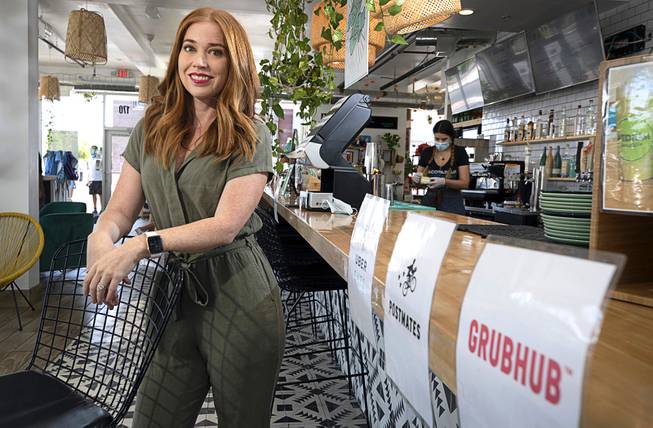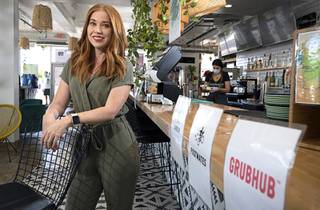
Kristen Corral, co-owner of Tacotarian, poses at the restaurant at Casino Center Boulevard and California Avenue, Wednesday, Aug. 5, 2020. The bar, at right, has spots listed for third-party pickup. The Clark County Commission passed an ordinance on Tuesday, Aug. 4, that prevents third-party companies from charging restaurants more than 15% in fees for their delivery services.
Thursday, Aug. 6, 2020 | 2 a.m.
Colin Fukunaga, owner of Fukuburger in Chinatown, said third-party delivery companies operating in Southern Nevada have acted “like sharks swimming around a carcass” in misleading customers to believe they are supporting local businesses during the pandemic while taking a big chunk of their checks.
The customers have become dependent on delivery and takeout as they remain at home to limit the spread of coronavirus. And with restaurant dining areas at 50% capacity under state guidelines, some establishments don’t have the ability to opt out of third-party delivery if they want to stay in business.
Relief is on the way.
The Clark County Commission voted unanimously this week to temporarily cap delivery fees imposed on food establishments by third-party delivery companies like Grubhub, Uber Eats and DoorDash while the coronavirus state of emergency is in effect.
Under an emergency ordinance, third-party companies providing food delivery will be prohibited from charging restaurants more than 15% of the price of online orders. Delivery service companies also can’t reduce drivers’ pay or increase service order fees.
The 15% cap went into effect Tuesday and will expire when the state of emergency that was declared in March because of coronavirus is lifted. Delivery service companies that violate the ordinance will be reported to the Clark County Business License Department, which will determine if disciplinary action is appropriate.
“This is a very modest attempt to help out our restaurant industry, particularly those mom and pops,” said Commissioner Tick Segerblom, who introduced the ordinance.
Kristen Corral, owner of Tacotarian, a plant-based Mexican restaurant with locations downtown and in southwest Las Vegas, said she pays third-party companies nearly $7,000 per month for food delivery service for one of her restaurant locations.
“It isn’t like this is saving a few pennies. This is going to save local businesses a huge amount of money,” she said.
Corral was one of at least 20 restaurant owners and managers who spoke in support of the delivery fee cap, pleading that charges of 25%-30% on a customer's bill was jeopardizing their ability to stay open.
Alexandria Dazlich of the Nevada Restaurant Association said Grubhub charges a 20% marketing fee, 10% delivery commission and 3% processing fee, totaling more than 30% for the cost of one order.
“While local restaurants suffer from lack of revenue during the pandemic, delivery companies are thriving,” Dazlich said.
Dazlich said that since the beginning of the pandemic, more than half of business owners who are members of the restaurant association have lost more than 70% of their revenue and 15% have closed their businesses permanently.
Aaron Bradley, owner of The Juice Box LV, said if his company were permitted to do in-house deliveries it would save him thousands of dollars, but because he sells unpasteurized, cold pressed juices that come in reduced oxygen packaging, he’s prohibited from delivering to consumers by Southern Nevada Health District regulations.
“There are some businesses, like mine, that absolutely have to use this (third-party delivery service),” he said.
John Anthony, managing partner of Sparrow + Wolf Neighborhood Cookery & Libations, said independent delivery wasn’t feasible for his business because of high insurance rates.
Rose McKinney-James of Grubhub said the company has invested millions in safety equipment for drivers and restaurants to help them “survive through delivering orders.” McKinney said in jurisdictions that cap delivery fees, cost is often passed on to customers and delivery service is limited. That, in turn, could limit the orders placed, which would also hurt the restaurant.
Piper Overstreet of Uber Eats said the company supported a 15% cap on commission fees for smaller establishments that have five or fewer locations in the state and a 20% cap for businesses with six or more locations, which would allow the company to “maintain reliability of Uber Eats as a service.”
Overstreet said fees are tied to the cost of insurance, driver pay, credit card processing and internet marketing. “I think we can all agree that the business of food delivery is expensive, which is why many restaurants did not offer it as an option before third-party services came along,” she said.
Corral, owner of Tacotarian, said the cap won’t make a big dent in the profit of large corporations providing food delivery service.
“These are billion-dollar corporations operated out of Silicon Valley. They’re still going to make money,” she said.

